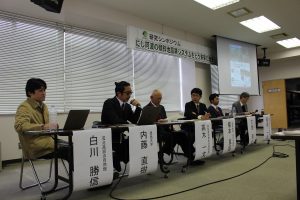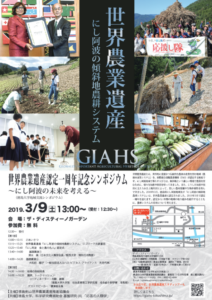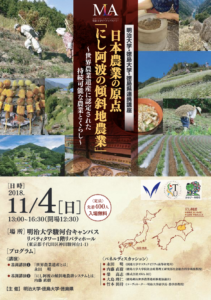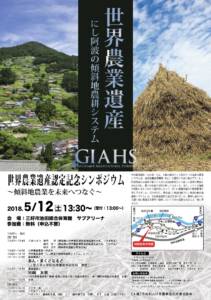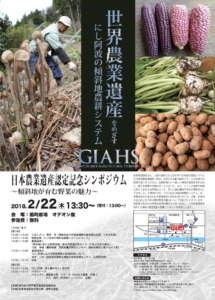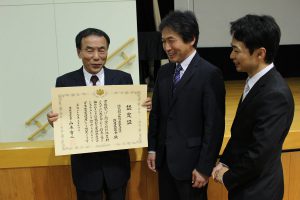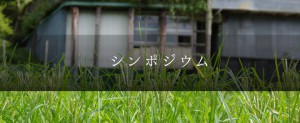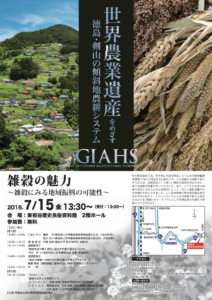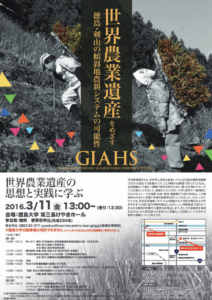“How to pass the Nishi-Awa Steep-Slope Land Agriculture System to the future generations?”
On March 28, 2019, Western Region Agricultural Research Center, National Agriculture and Food Research Organization (NARO), hosted a symposium called “How to pass the Nishi-Awa Steep-Slope Land Agriculture System to the future generations?” In the first part of the symposium, Professor Katsunobu Shirakawa (Geihoku Kogen no Shizenkan) presented a seminar on an innovative initiative for the Hiroshima town, Hiroshima Prefecture. The initiative was proposed to boost the local economy by exchanging wood for local currency. Associate Professor Naito presented an overview of the Nishi-Awa steep-slope agricultural system. Mr. Kazufumi Takagi spoke about the diverse indigenous crops grown in this region, and Professor Yoshinobu Kusumoto discussed the differences between the Traditional […]
The 1st anniversary of the designation of Nishi-Awa as a Globally Important Agricultural Heritage System (GIAHS) site
It’s been 1 year since the Food and Agriculture Organization designated the Nishi-Awa steep-slope agricultural system” as a Globally Important Agricultural Heritage System (GIAHS) site. The symposium was organized to celebrate the first anniversary of this event. Professors Hiromu Shimizu and Junko Owada were the keynote speakers at the event. At the “Nishi-Awa Nou to Shoku no Meijin” certification ceremony, eight people were certified by Tokushima Prefecture. In addition, nine people, including elementary and high school students and members of the agricultural groups from the Nishi-Awa region, provided presentations regarding their activities over the past year since the designation. The symposium was an occasion to connect with the local people […]
Origin of Japanese agriculture: The Nishi-Awa steep-slope land agriculture system
On November 4, 2018, a symposium on one of the Globally Important Agricultural heritage System (GIAHS) sites, the Nishi-Awa steep-slope land agriculture system, was held at the Meiji University. Title: Origin of Japanese agriculture: The Nishi-Awa steep-slope land agriculture system Date: November 4, 2018 Venue: Liberty tower, Surugadai Campus, Meiji University Sponsor: Meiji University, Tokushima University, Tokushima Prefecture Program <Lectures>Keynote speech 1: What is Globally Important Agricultural Heritage System (GIAHS)? By Mr. Akira Nagata (UNU-IAS) Keynote speech 2 : What is the Nishi-Awa Steep-Slope Land Agriculture System? By Professor Naoki Naito (Tokushima University) <Panel discussion>Coordinator: Professor Tamotsu Takemoto (Vice-president and Professor, School of Agriculture, Meiji University) Panelists: Mr. Nagata(UNU-IAS), Pro. […]
A Symposium Commemorating the Nishi-Awa Steep Slope Land Agriculture System Designation as a GIAHS site
The Symposium was held on May 12, 2018, to commemorate the recognition of the Nishi-Awa region as a GIAHS site, with approximately 130 residents and others in attendance. We invited Pro. Anne MCDONALD (Graduate School of Global Environmental Studies, Sophia University), a member of the Scientific Advisory Group (SAG) for GIAHS, and Mr. Tasaki Tomonori from Takachihogo Shiibayama, which was designated as a GIAHS site in 2015, as lecturers for the symposium. Pro. Anne spoke from his perspective on the history of GIAHS, his experiences at other sites, and the advantages and challenges of the Nishi-Awa region of Tokushima Prefecture, which he visited in November 2017. A panel discussion was […]
Symposium for the Recognition of Japanese Nationally Important Agriculture Heritage System: Thinking through vegetables grown in sloping areas
The “Nishi-Awa steep slope agricultural system” in Japan was recognized as an agricultural heritage site, in March 2017. A symposium was held on February 22, 2018, which was attended by approximately 100 local people. Hiroki Kawashima, who has long been conducting research on sloping-land vegetable cultivation in the Tsurugi Mountains, delivered a lecture on his research. Kazufumi Takagi delivered a lecture on different types of vegetables, wild plants, and medicinal herbs grown in the Nishi-Awa region. His lecture ranged from cultivation techniques to marketing and cooking. After the conclusion of lectures, the “Nishi-Awa Nou to Shoku no Meijin” (food and agriculture experts in Nishi Awa) certification ceremony, hosted by Tokushima […]
Awarding Ceremony of “Japanese Nationally Important Agriculture Heritage System”
We participated in the awarding ceremony of “Japanese Nationally Important Agriculture Heritage System” held at the Ministry of Agriculture, Forestry, and Fisheries on April 19, 2009. At the ceremony, Mr. Yamamoto, Minister of Agriculture, Forestry, and Fisheries, presented the certificate of the Japanese Nationally Important Agricultural Heritage System to Mr. Kanenishi, Mayor of Tsurugi Town, who is the chairman of this council. At the commemorative symposium, the keynote speech was delivered by Prof. Kazuhiko Takeuchi, Vice President of the United Nations University and Deputy Director of the Integrated Research System for Sustainability Science (University of Tokyo). In addition, the eight regions that have been designated as Japanese nationally important agriculture […]
Symposium “Making the Most of Sloping Soils: Traditional Techniques and Possibilities.”
The symposium was held on March 4, 2017, and was attended by approximately 100 local people. People living in the mountainous areas of Nishi-Awa have developed a variety of wisdom and techniques for farming in the harsh environment of steep slopes. The purpose of the symposium was to discuss the geological and environmental factors that led to the establishment of farming in sloping lands and the adaptive technology that makes the most of soil characteristics. We also had a fresh look at the appeal of the "Nishi-Awa Slope Farming System. Dr. Hiroshi Yamamoto and Dr. Yoichi Nakamoto, who have long been involved in research in sloping land agriculture in the […]
A Symposium on “Possibilities for Regional Developments in Indigenous Millets”
Title: Possibilities for Regional Developments in Indigenous Millets Date: July 15, 2016 Venue: Higashi-Iya History and Folklore Museum Sponsor: Tokushima Tsurugisan Global Agricultural Heritage Promotion Council Secretariat Participation fee: free The Food and Agriculture Organization of the United Nations (FAO) recognizes globally important agricultural systems through the Globally Important Agricultural Heritage System (GIAHS). People living in the mountainous areas of Nishi-Awa have incorporated a variety of wisdom and techniques to farming in the harsh environments of steep slopes. The land use supported by such indigenous wisdom and technology has contributed to beautiful rural landscapes and biodiversity. The purpose of this symposium was to discuss the possibilities and challenges of regional […]
“Aiming for The Globally Important Agricultural Heritage System: Potential for Steep Slope Land Agriculture System in Mt. Tsurugi”
The symposium was held at Tokushima University on March 11, 2008, and attended by approximately 130 local people. The purpose of this symposium was to rediscover the characteristics and potential of indigenous agriculture in the Nishi-Awa region by comparing it with agricultural practices of other parts of the world and Japan. The symposium also considered the possibilities and challenges of utilizing indigenous agriculture as a resource for the future of local communities and the entire humanity. Ms. Naoko Takemoto, who works at the Food and Agriculture Organization of the United Nations, Liaison Office in Japan; Dr. Evonne Yiu, who is in charge of the Globally Important Agricultural Heritage Systems at […]
Indigenous Agriculture Attracts Tourists from Around the World: The Potential of Agricultural and Cultural Tourism in Nishi Awa
The symposium was held at Higashi Miyoshi Town, Miyoshi Toubu Welfare Center, on February 9, 2016, and attended by approximately 100 residents. The keynote speakers were Yukinori Hosaka, who runs the Ku-neru-asobu guesthouse in Higashi Iya and the COCO-CROSS guesthouse, and Masaaki Yamagishi, who runs the Shimakoya guesthouse on Naoshima in Kagawa Prefecture while also working as a member of the community-reactivating cooperator squad. We conducted a panel discussion thereafter. Mr. Hosaka, a pioneer in the management of guesthouses and acceptance of foreigners in Nishi-Awa, gave two lectures, focusing on his activities, to raise the awareness of local people: "A new culture is born when travelers and immigrants interact with […]

